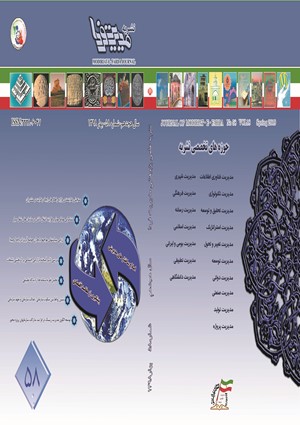شناسایی مولفههای رهبری معنوی و بررسی تاثیر آن بر سلامت سازمانی
محورهای موضوعی :
مهدی تقوائی
1
,
علیرضا خوراکیان
2
,
فریبرز رحیم نیا
3
![]() ,
سعید مرتضوی
4
,
سعید مرتضوی
4
![]()
1 - دانشگاه فردوسی مشهد
2 - دانشگاه فردوسی مشهد
3 - دانشگاه فردوسی مشهد
4 - دانشگاه فردوسی مشهد
کلید واژه: رهبری معنوی سلامت سازمانی ساختدهی نوعدوستی نفوذ مدیر,
چکیده مقاله :
سازمان سالم در پرتو رهبرانمعنوی ضمن حفظ پايداری، در درازمدت توانايي بقاء و گسترش سازمان را ایجاد میکند. این تحقیق در تلاش است تا در بستر دانشگاهها، مولفههاي رهبری معنوی را شناسایی و اثر آن را بر سلامت سازمانی بررسی نماید. روش تحقیق در این مطالعه تحلیل محتوا و پیمایش است. در این تحقیق با ورود به دانشگاههای شمال شرق ایران و استفاده از ابزار مصاحبه به کشف مولفههای رهبری معنوی پرداختهشد که از تحلیل مصاحبه خبرگان، 11 مولفه شامل؛ تحول آفرین، یکپارچگی روانشناختی، معناداری، بازخورد عملکرد، تعهد سازمانی، عضویت، ایمان، عشق به نوعدوستی، چشم انداز، ارزش محور و الگوی بعنوان سرمایه اجتماعی در سه سطح فردی، گروهی و سازمانی بدست آمد. جهت تأیید استحکام دادهها در بخش کیفی این پژوهش از قابلیت اعتبار، قابلیت اعتماد، قابلیت وابستگی و قابلیت انتقال استفاده شد. در بخش کمی نیز جهت سنجش روایی پرسشنامهها از دو روش روایی محتوا و روایی سازه بهره گرفته شد و جهت سنجش پایایی پرسشنامهها نیز از آلفاي کرونباج استفاده شد (پرسشنامه رهبری معنوی 993/0 ، پرسشنامه سلامت سازمانی 775/0) همچنین نتایج، اثر رهبری معنوی بر سلامت سازمانی را نشان میدهد.
Abstract A healthy organization, with its spiritual leadership, while preserving sustainability, will in the long run creates the ability to survive and expand the organization. The research seeks to identify, in the context of universities, the components of spiritual leadership and its impact on organizational health. The research method in this study is content analysis and scrolling. In this research, entering the universities of northeastern Iran and using the interviewing tool, we discovered the components of spiritual leadership, which consists of analyzing the interviews of the experts, 11 components including transformational, psychological integrity, meaningfulness, performance feedback, organizational commitment, membership, faith, altruism, vision, value-based and social capital model were achieved at three levels: individual, group and organizational. In order to confirm the data strength in the qualitative part of this research, credibility, reliability, dependability and portability were used. In the quantitative part, for assessing the validity of the questionnaires, two methods of content validity and construct validity were used. The reliability of the questionnaires was also measured using Cronbach's alpha (Spiritual Leadership Questionnaire (0.993), organizational health questionnaire (0.775), and the results of spiritual leadership shows the health of the organization.
